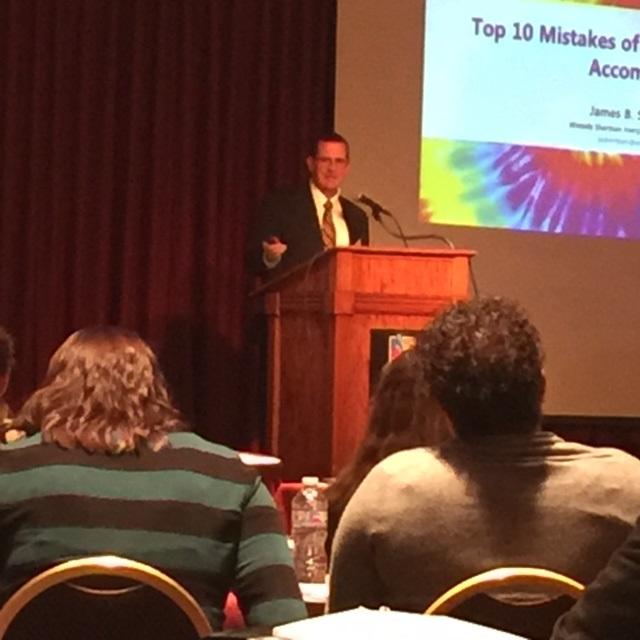|
Consult with experienced labor & employment lawyers whenever you need advice, without worrying about legal fees!
|
For more information about Wessels Sherman's unique Phone Consultation Program, check our web page by clicking on the below link; or contact Tyler Birschbach at (952) 746-1700, or email him
here.
|
|
|
|
Did You Know?
|
|
Wessels Sherman has well-staffed offices with experienced attorneys to assist with our readers' legal needs in Wisconsin, Illinois and Iowa too. Businesses with operations/matters in these states are encouraged to call any of our attorneys for assistance. Additionally, Wessels Sherman attorneys regularly work with other lawyers as a highly cost-effective and trusted co-counsel and local counsel. Referrals are always appreciated and respected.
|
|
|
|
|
Minnesota Client Alert
Legal News for Minnesota Employers
May 2016
|
 |
|
 |
James B. Sherman |
What do you get when the U.S. Department of Labor abruptly more than doubles the minimum salary employees must be paid in order to qualify as exempt from the overtime requirements of the Fair Labor Standards Act (FLSA)? For starters, you impact many millions of employees (an estimated 4-5 million). Employers are faced with the dilemma of choosing either to: (1) increase salaries of affected employees to the new minimum - increases of up to 100% in some cases - in order to keep them exempt from overtime; or (2) reclassify workers from exempt to non-exempt status, thus making them eligible for overtime pay. So what's the big deal? The Obama administration claims
the final rule, which takes effect on December 1, 2016, will result in big pay hikes for millions of employees whose salaries currently fall below the new $47,476 annualized minimum exempt salary level. The administration's theory is that employees will receive a DOL imposed salary hike, or lots of extra pay in the form of overtime pay at the FLSA required rate of 1½ times the regular rate for all hours worked over 40 hours in a workweek. To be sure, employers who fail to assess the impact of the sweeping changes under the DOL's new rule, will likely see huge spikes in payroll costs before the year is out; that, or lawsuits from plaintiff wage and hour lawyers who are just licking their chops at the many prospects for claims against unsuspecting employers. The potential impact to the bottom line may be enough to put some employers out of business. Particularly hard hit are retail, hospitality, healthcare and non-profit organizations, although employers in manufacturing, transportation, food and many other industries will no doubt be affected as well. Wessels Sherman aims to help employers deal with these changes.
|
 Employers often want to know when enough time has passed that they are safe from potential lawsuits or charges of discrimination, harassment and/or retaliation. Under federal laws such as Title VII, the ADA, or ADEA, employees generally have 300 days (i.e. roughly 10 months) to file a charge with the EEOC. However, the Minnesota Human Rights Act gives employees one full year to bring such claims under state law. Unfortunately, these already-ample limitation periods for employees to sue their employers may be extended even longer... Employers often want to know when enough time has passed that they are safe from potential lawsuits or charges of discrimination, harassment and/or retaliation. Under federal laws such as Title VII, the ADA, or ADEA, employees generally have 300 days (i.e. roughly 10 months) to file a charge with the EEOC. However, the Minnesota Human Rights Act gives employees one full year to bring such claims under state law. Unfortunately, these already-ample limitation periods for employees to sue their employers may be extended even longer...
|
 NLRB Judge Says Misclassifying Employees as Independent Contractors Violates Federal Labor Law
NLRB Judge Says Misclassifying Employees as Independent Contractors Violates Federal Labor Law
|
|
Treating workers as non-employee, "independent contractors" can land employers in trouble with a wide variety of federal and state government agencies if the workers are determined to be employees under any number of laws, each with its own definition of who is an "employee." Misclassifying employees as independent contractors typically means that no employment taxes are withheld, no unemployment taxes are remitted worker's compensation and group health insurance is not provided, among other liabilities. Consequently, when federal or state agencies such as the IRS or Minnesota Department of Employment and Economic Development challenge employers using independent contractors through an audit or in response to a worker's complaint, the liability can be massive.
To make matters worse, thanks to a recent unfair labor practice, or ULP complaint issued by one of its Regional Directors in Los Angeles, CA, the National Labor Relations Board (NLRB) can be added to the list of agencies that may challenge an employer's use of independent contractors and/or other contingency workers. The complaint is unique in that it alleges the employer, Intermodal Bridge Transport, misclassified its drivers as independent contractors and, in doing so, interfered with the protections employees are to enjoy under federal labor law. This complaint follows a directive from the NLRB's General Counsel in Washington, D.C., Richard Griffin, for the Board's Regional Directors to explore issues involving "the employment status of workers in the on-demand economy." It also is consistent with the NLRB's ongoing efforts to expand the agency's reach into non-union workplaces...
|
 Wessels Sherman hosted another successful, well-attended seminar on May 13th in Milwaukee, WI. The theme of the event was "a day of lists," where attorneys gave fast-paced, succinct presentations on some of the most common and important issues, together with solutions, on troublesome HR areas such as FMLA, employee discipline, wage and hour/FLSA worker's compensation and labor unions. Pictured is firm President/CEO and managing shareholder of Wessels Sherman's Minnesota office, James Sherman, giving a spirited presentation on 10 common ways employers fail to accommodate individuals with disabilities under the ADA and similar state laws.
Wessels Sherman hosted another successful, well-attended seminar on May 13th in Milwaukee, WI. The theme of the event was "a day of lists," where attorneys gave fast-paced, succinct presentations on some of the most common and important issues, together with solutions, on troublesome HR areas such as FMLA, employee discipline, wage and hour/FLSA worker's compensation and labor unions. Pictured is firm President/CEO and managing shareholder of Wessels Sherman's Minnesota office, James Sherman, giving a spirited presentation on 10 common ways employers fail to accommodate individuals with disabilities under the ADA and similar state laws.
We are pleased to announce to our Minnesota clients and friends that our annual seminar returns to Minnesota next spring, 2017! Watch for dates and other important details on this exciting event in future newsletters. We hope to see you there!
|
|
Final DOL Overtime Exemption Rule Webinar
June 2nd 1:00 - 2:00 PM
Presented by Wessels Sherman shareholders
James B. Sherman, Esq. and Sean F. Darke, Esq.
|
|
In this webinar, we discuss:
- Deciphering the new 2016 White Collar Exemption Regulations that radically alter exempt/non-exempt salary criteria;
- Understanding how and to what extent, non-discretionary and incentive payments be credited toward a portion of the new minimum salary;
- Evaluating the DOL's "catch-up" option; and
- Special issues concerning automatic adjustments to the minimum salary, every 3 years.
|
|
|
|
|